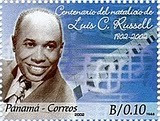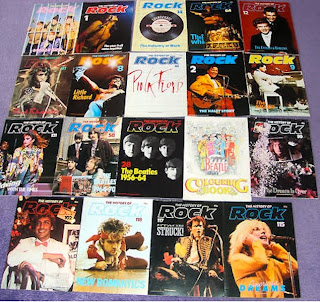Please note the question mark in the title as a) the set below is issued by Proper Records, whose quality control is not always of the best, and b) I haven't yet got my mitts on a copy.
But I still need to draw your attention to this four disc collection of the jazz which poet and funster Philip Larkin very publicly liked. Ignore the cruel remark of a friend who said that this blog would not be her first port of call for dependable information about musical figures; in the area covered by this compilation I can speak - er, with intermittent authority. At the very least.
I discovered Luis Russell (commemorated philatelically, above, by the homeplace hymned in his masterpiece) before realising Larkin was also a fan - before realising Larkin existed, in fact. But reading All What Jazz, his collection of music crticism, led me to other jazz artists and helped cement my love for Louis Armstrong.
Not that this was a forsaking of pop: I seem to remember that when the Beatles' Hamburg tapes eventually came out on vinyl I borrowed it from my local library along with an Armstrong memorial compilation (on Parlophone, incidentally), as though to test whether I could find the same magic in both.
I'm particularly pleased to see that a track on that Chris Ellis-compiled Armstrong LP, the great man's take on St Louis Blues backed by the Russell Orchestra, is included in Larkin's Jazz - as I mentioned in an earlier entry, here, he called it The Hottest Jazz Record Ever Made in an article included in the original hardback edition of his jazz criticism, All What Jazz, but mysteriously left out of the later paperback.
Now you has hot jazz ... and now you doesn't.
Did he recant between editions? Pretty big claims were made, after all: he specifically said that by a certain chorus you could feel the walls start to move; I think I wanted to feel that in the newly issued ancient Beatles recordings too.
As did others: I remember walking into one Glasgow record shop, possibly a branch of Listen if it was still on the go, where they were playing Roll Over Beethoven from the Hamburg tapes. I thought I could sense the assistants wanting to like it - wanting, perhaps, to hear more in it than could be wrested out of those dodgy tapes.
Charles Shaar Murray reviewed it in NME alongside The Beatles at the Hollywood Bowl, coming out strongly in favour of the latter. He dismissed the German recordings with a remark like: "Dig it: there isn't a single recognisable lead vocal in the entire double album."
My life has been a series of wasted opportunities, but of particular relevance to this entry is a moment, a few years ago, where a course of action was open to me, didn't represent any great difficulty, and yet I didn't seize hold. It is quite possible that it would have turned to ashes anyway, but I wonder.
Near where I now live there was a record stall or shop in a covered market area. One afternoon I saw a copy of the Beatles' Hamburg Recordings, not in the original black album cover but in a light beige or cream cover, pretty much as above (images from discography site JPGR).
image: doyouremember.co.uk
Now, my moleish mind knew that this change of sleeve and record company was significant because I had read, possibly in a 1980s partwork series called The History of Rock (probably in one of those Beatles issues above - click to enlarge), that the disappointment many people felt with the sound quality of the original album had been rectified in that later vinyl issue - not, I think, by any magic but simply by undoing the overprocessing of the original source which had been a big feature of the original issue's attendant publicity: the company kept stressing how much money had gone into improving the sound so we wouldn't think that an old tape had been foisted on us to make money - whereas you, I and the late John R.T. Davies know that a lightness of touch with the original source is generally better. Chris White wrote in the original Lingasong issue sleevenotes:
A lot of time and considerable financial investment has been spent on each of the 20-plus tracks, transferring the original mono takes to 16-track form and improving their sound quality. It should be emphasised however that no way has the actual music been interfered with - nothing has been added or detracted from the Beatles' original performance, all that has been is that the tape has been cleaned and what were originally very raw recordings have now become extremely listenable product.Hmm ... even though the article in The History of Rock certainly wasn't saying that a studio quality masterpiece was thereby unveiled, it did seem to be promising something a great deal more endurable than the first vinyl issue.
Which seemed to tie in with my first reading about it, in a dentist's waiting room in the former Steelopolis. Not, I hasten to add, via the usual ancient copy of the Scots Magazine mouldering on the table but in a copy of Melody Maker which I had brought along to while away the time before the inevitable pain. This was a few years before the record ever came out, and may have been the first publicity about the tapes; from a quick look over the net it would appear to have been 1973.
It was an interview either with Alan Williams or Kingsize Taylor (in his pomp, above), who owned the tapes (Lennon had apparently given him permission to record in return for drinks), and there was a point where Taylor (or Williams) played some of the tape to the journalist.
And grinned.
Because he knew it wouldn't disappoint. The reporter said something in the article to the effect that hey, it wasn't as bad as some of the Billie Holiday live recordings which are issued, so it was perfectly serviceable. And if The History of Rock was to be believed, that cream LP contained something more closely approximating to the grin-inducing version orginal tapes.
I would have read about that second record in 1981 or 1982. Happening upon the entity itself would have been about ten or fifteen years after that. But I hadn't forgot about it when I came across it in that record stall.
But I hovered over the cream-sleeve ... and gave it a miss. Bye bye that, and so many other opportunities.
True it was twenty quid which, at the time, I probably couldn't afford too easily. Maybe, I don't know, I also felt that paying top dollar would take away the pleasure of feeling I had made a discovery on my own. Whoever priced it had presumably read up about its superior sound quality too, so it wasn't to be the discovery which would vindicate all my years spent absorbing information about pop music (ie not a bargain thanks to all my book-and-music-paper larnin').
It might also have been the case that I had a reasonable certainty that whatever improvement there might have been would not have conjured the Beatles back from the dead (and Lennon himself had already been dead a year or two) or yielded more than the most distant echo of the actual experience of seeing them then.
Maybe there was also the memory of straining, a few years earlier, to enjoy the Hamburg stuff on its original issue, to feel it was something fully formed that brought joy, as opposed to something that you were vaguely glad existed in some form but didn't really want to revisit after you'd sat through it just once for the needless confirmation you weren't denying yourself some hitherto unknown ecstacy.
And in more recent years (and even in a half-formed play which I may eventually put up here) my thoughts have turned to a gig which wasn't recorded but is regarded as the start of Beatlemania - in Liverpool, anyway. And by Macca himself, I believe. Litherland Town Hall (above, during a post-gig cleanup), just after they'd first come back from Germany and a buzz was building about them. And suddenly it wasn't the old Beatles but a more assured group, storming it on their home turf. (Below: current incarnation as an award-winning, plaque-refusing health centre.)
If it turns out there happened to be a microphone waggled about in the (pre-medico) Litherland after all - when a tape enthusiast dies and his kids finally go through his horde in the attic, say, and stumble upon ... but no, that probably would have happened by now.
If I recall correctly, there was a short five minute programme on BBC 2 where a Liverpudlian was interviewed at Litherland Town Hall, talking about the experience (or a location and experience like it). And it presumably lives in the heads of however many were present and are still alive, jumbled up in most cases with memories of the group before and after.
Which is maybe how it should be. My Cheapo Gaffe friend once talked about the discovery of an early His Master's Voice test recording of some kind made by her late grandfather, who had worked for Marconi for a while. Presented with the disc, her grandmother refused to listen to it - either, I presume, because it would make an old wound raw again, or because she knew that the idea of someone, the multiple exposure of memories, is a much more potent and living thing than a single, reductive snapshot.
So not much about Larkin in this entry after all, then. Not directly, anyway.
Except that if, as is believed, the Hamburg tapes were recorded on 31st December 1962, and if (my exhaustive research taking me as far as wikipedia) the Not Guilty verdict on DH Lawrence's infamous novel was delivered on 2nd November 1960, then Kingsize Taylor captured the pre-Fabs
Between the end of the Chatterley ban
And the Beatles' first LP.
















No comments:
Post a Comment